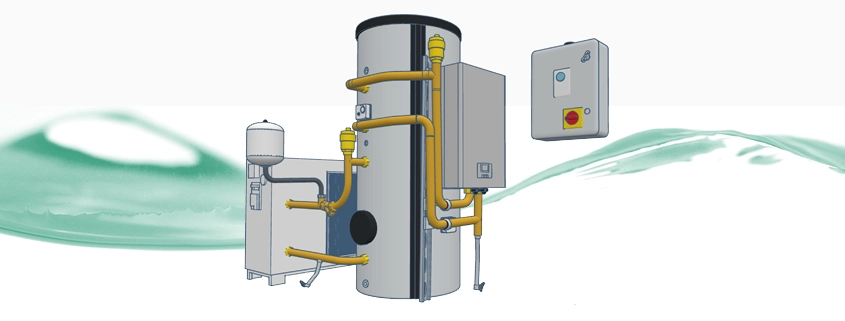Adveco looks at new ways to approach hot water system redundancy in the modern commercial landscape and why it matters…
Reliable access to hot water is often a business-critical service, often as important as electricity or internet connectivity. System downtime can be extremely risky for organisations, and depending on the industry, hot water outages can create significant operational hurdles. Hospitals might struggle to maintain hygiene standards, food service establishments could face challenges sanitizing equipment and utensils, and manufacturers might encounter production line stoppages, impacting product quality and delivery timelines. Such unscheduled hot water outages can lead to financial losses through lost productivity, customer dissatisfaction, and potential penalties in specific industries. Hotels might accrue compensation costs for inconvenienced guests, restaurants could face closure due to hygiene regulations, and manufacturers might incur delays impacting production schedules and delivery deadlines. This all impacts a business’ reputation and customer trust. Negative online reviews, complaints, and lost business opportunities can be difficult to overcome, jeopardising future success.
From bustling hotels and healthcare facilities to manufacturing plants and food service establishments, disruptions in hot water supply can bring operations to a halt, impacting revenue, productivity, and even patient care. This makes building redundancy into commercial hot water systems a critical practice, offering multiple benefits beyond just backup…
- Improved Efficiency: Modern redundant systems can be designed to operate more efficiently. Backup kicks in only if and when needed, reducing overall energy consumption.
- Enhanced Reliability: Even with regular maintenance, equipment can malfunction. Redundancy provides a safety net so that the hot water supply isn’t completely compromised. Especially important for businesses where consistent hot water is essential.
- Minimised Downtime: A single failure can cause significant downtime, leading to lost productivity, revenue, and customer dissatisfaction. Redundancy ensures a backup system takes over, minimising downtime and keeping operations running smoothly.
- Reduced Risk Factors: Beyond downtime, a failed hot water system can pose safety hazards, such as Legionnaires’ disease growth in stagnant water. Redundancy helps mitigate these risks by ensuring a continuous flow of hot water that maintains proper temperatures.
- Faster Recovery: With a redundant system, repairs and maintenance can be carried out on a single unit without completely shutting down hot water access. This translates to faster recovery times and minimises disruption to daily operations.
Redundancy in commercial hot water systems essentially involves incorporating multiple heat sources or backup options to ensure hot water availability even if one component fails. This can be achieved through various strategies, but typically building design will opt for a dual boiler application, whereby two independent boilers ensure hot water production continues even if one malfunctions. This is particularly seen in high-demand applications or facilities operating 24/7. The problem with this approach is a system is immediately oversized, a common issue seen in commercial water heating. Oversizing leads to greater upfront capital investment, greater demands on often limited plant room space, more complex controls and potentially higher operational costs. Better to have a single application that delivers resilient water heating without needing to double up on the hardware.
Having dedicated hot water storage tanks is a more cost-effective option. This provides a buffer should primary heating systems encounter issues, helping to ensure hot water remains available during repairs. Systems built around indirect cylinders are particularly interesting as these enable a diversification of energy sources. Such hybrid systems can utilise a variety of fuel sources whether gas, electricity, or renewable energy from air source heat pumps (ASHP) or solar thermal collectors. This versatility prevents reliance on a single potentially vulnerable source. It is, however, worth remembering that hybrid hot water systems which use heat pumps or solar would not solely achieve the high temperatures demanded by commercial applications year-round. Solar would struggle during the darker winter months for example, yet could cover as much as 100% of the energy demands in Summer months, while heat pumps could be pushed to generate hot water when ambient temperatures drop, but this comes at high operational costs and temperatures could still be well below the necessary 60 C, so application design needs to take careful consideration of year-round 24/7 operational resiliency requirements.
FUSION – A Resilient Hot Water System
Adveco FUSION embraces a number of these approaches in a single product to provide system redundancy and assured hot water demands. Fusing either an ATSI or ATST stainless steel indirect vessel with the ARDENT electric boiler an optional FPi32 ASHP and electric immersions makes FUSION one of the most resilient options for commercial water heating projects on the market.
The high-quality 316Ti and 316L stainless steel alloy used in the cylinders creates a protective oxide barrier on the waterside that naturally helps prevent corrosion, even when temperatures increase. In hard water areas, scale build-up is highly curtailed by the use of the ARDENT boiler for primary indirect heating.
System control is also a critical element for delivering resiliency. For FUSION, a mix of innovative design and dedicated controls ensures the ASHP preheat and electric boiler work seamlessly to deliver the highest operational efficiencies, balancing the use of the heat sources to maximise efficiency and extend the lifespan of the hardware. The Adveco ARDENT electric boiler features two or three heating elements with six or nine circuits, these too are balanced to optimise system longevity, and should a circuit fail the system will automatically balance those remaining to continue to meet all demands. Should 24/7 resiliency be absolute, then all FUSION E & T variants can be extended with the inclusion of an electric immersion for emergency backup. Though not an efficient or cost-effective technology for primary heating, immersions are excellent for short-term use in an emergency and the inclusion ensures that there is no single point of failure within the FUSION system.

The system FUSION controls monitor the heat pump, immersion and water flow. This provides a clear sight of energy and water usage which is critical for gaining early warning of any issues with the system, for the FUSION-Tplus and FUSION-Eplus variants additional controls manage the emergency switch over to electric immersion heating. Building managers will receive a text alert to warn that the system has switched over to back-up mode which should instigate an immediate response in line with warranty and maintenance contracts. As with any hot water system, regular preventive maintenance is a necessity to reduce the risk of unexpected breakdowns and ensure all system components are functioning optimally.
Mitigating Service Outages And More
While the primary benefit of redundancy lies in mitigating outage risks, it offers a range of other advantages as we have demonstrated with FUSION, not least the increased system lifespan gained by distributing the workload across multiple system elements, reducing wear and tear on individual components, potentially extending their lifespan and reducing overall maintenance costs. Implementing a combination of systems such as a high-efficiency gas or electric boiler and solar thermal collectors can drive greater business efficiency by optimising energy consumption and reducing long-term operating costs. Certain industries and facilities will also have specific hot water availability regulations, meaning redundant systems help ensure compliance and avoid potential fines or penalties.
Remember to consider the potential financial losses and reputational risks associated with hot water outages when evaluating the upfront investment. Adveco can help work with you to create a system design that offers optimal benefits within your budget and space constraints. Installing additional boilers or storage tanks might require dedicated space, which can be a limiting factor in some buildings. Consider space-saving solutions such as the highly compact FUSION system or explore options such as utilising multiple smaller cylinders instead of a single large one. Adveco offers the widest choice in the UK of cylinders both in terms of capacity and form to help address issues of space. Adding redundancy inherently adds complexity to a system, FUSION is a preconfigured offering, but Adveco also has a team of qualified engineers who can create bespoke alternatives if a more complex system is required. In the latter case it is worth remembering you may also require more comprehensive maintenance support. You should regularly maintain all components of your hot water system, regardless of redundancy, to prevent issues and ensure optimal performance, but Adveco can provide specialist knowledge and a manufacturer-level servicing programme which is well worth factoring into a specification.
Knowing that a building’s hot water supply is protected against unforeseen issues and disruptive impacts not only delivers business continuity but also valuable peace of mind. Building system redundancy into commercial hot water is not just an option, but a wise investment. By mitigating the risks of downtime, protecting against financial losses and reputational damage, and even offering opportunities for improved efficiency and system longevity, redundancy ensures uninterrupted hot water flow, keeping your business running smoothly and successfully. While careful consideration of cost, space, complexity, and maintenance needs is crucial, the benefits of a resilient hot water system significantly outweigh the initial investment. In today’s competitive landscape, ensuring reliable hot water availability is not just about convenience, but a strategic decision that safeguards your business operations and future success.
















